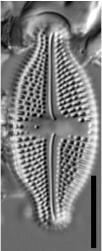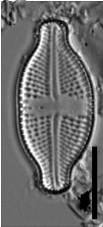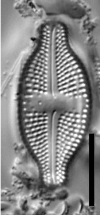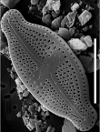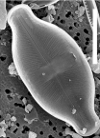Images
Click any image to enlarge...
LM image scalebar = 10 µm = 72 pixels
SEM image scalebar = 10 µm
Observations
| Observations: | Bart Van de Vijver |
|---|---|
| Length: | 24–30 µm |
| Width: | 10–12 µm |
| Striae: | 17–19 in 10 µm |
Description:
Valves elliptic to lanceolate-elliptic with distinctly convex margins and rostrate apices with rounded poles. Valve outline shows no differences between larger and smaller individuals. Valve length 24–30 mm, valve width 10–12 mm. Axial area moderately wide, linear, leaving a distinct hyaline area bordering the raphe branches. Central area forming a more or less rectangular to slightly wedge-shaped stauros. Isolated, irregularly placed areolae sometimes present in the central area. On the stigma-bearing side of the valve, usually two to three short areolae bordering the central area; on the opposite side, striae usually reduced to single areolae. Stigma rather circular in light microscopy (LM), situated somewhat halfway between the central nodule and the valve face margin. Raphe branches weakly curved with the central raphe endings distinctly deflected, opposite to the stigma and terminating in enlarged, droplike pores. Terminal raphe endings short, weakly curved with drop-like pores. Transapical striae radiate throughout, composed of three to six rounded, near the valve margin transapically elongated areolae, 17–19 in 10 mm. Areolae varying in shape and size with smaller, rounded areolae alternating with more transapically elongated ones. Internally, poroids of the valve face usually occluded by hymenes, confluent with the striae, forming a continuous strip across each stria. Internal stigma opening consists of a curved, irregularly lipped slit.
| Morphology: | Naviculoid |
|---|---|
| Distribution: |
Autecology:
Notes:
Based on its valve outline, L. caubergsii takes an intermediate position between the typically rostrate to rostrate-capitate L. muticopsis and the obtusely rounded L. mutica. Navicula obligata Hustedt. Due to its valve outline and striae structure, Navicula obligata Hustedt might be mistaken for L. caubergsii. However, N. obligata shows a different raphe structure with terminal fissures that are clearly prolonged on the mantle/valve face margin; whereas, L. caubergsii has short, droplike terminal endings. The central area in N. obligata is more clearly delimited while in L. caubergsii, several irregularly placed areolae are present. Other species that show some resemblance include L. mitigata (Hustedt) Mann, L. seposita (Hustedt) Mann and L. incoactoides Lange-Bertalot & Rumrich. The former differs by having a transapically elongated stigma; whereas, the two other species have a completely different raphe structure: whereas *L. caubergsii* has simple, deflected central raphe endings and short terminal fissures, L. seposita and L. incoactoides present elongated terminal fissures and doubly curved central endings.
Other sites with Luticola caubergsii
- Crater Lake (soil), Deception Island
Original Type Description
| Author: | Van de Vijver 2008 |
|---|---|
| Length: | 24–30 µm |
| Width: | 10–12 µm |
| Striae: | 17–19 in 10 µm |
Original Description:
Valvae ellipticae ad lanceolatas-ellipticas marginibus distinct convexis apicibusque rostratis. Longitudo 24–30 mm, latitudo 10– 12 mm. Area axialis moderate lata. Area centralis formans staurum rectangularem vel leviter cuneatam. Ad latus ferens stigma solitaria, 2–3 series areolaerum praesentes. Rami raphis leviter curvati extremis centralibus distincte deflexis. Fissurae terminales raphis curtae, leviter deflexae poris terminalibus guttiformibus. Striae transapicales omnino radiatae, 17–19 in 10 mm. Areolae in media parte striarum minores quam areolae in extremis striarum.
New combination
| Author: |
|---|
Citations
Index Nominum Algarum (INA):
- Original
- New Combination
- If an INA link is available, it will be shown above
- The INA is a bibliographic reference "card file" for algal taxonomy, containing nearly 200,000 names of algae (in the broad sense).

